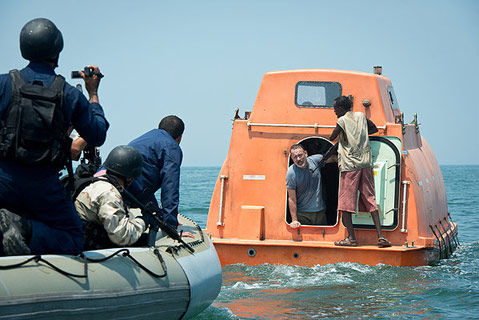Review: Captain Phillips
Tom Hanks and Barkhad Abdi star in a film written by Billy Ray, based on the book A Captain’s Duty: Somali Pirates

To make an embarrassing confession, hearing about a new movie starring Tom Hanks generally gives me pause verging on expectation of pleasant mediocrity, given his filmographic tendency to play up his persona as one of Hollywood’s Mr. Nice Guys. Captain Phillips is one of the exceptions in Hanks’s work, pointing up the danger of stereotyping and conclusion-leaping. Based on a true story, Captain Phillips deals with a 2009 hijacking episode with Somali pirates attacking a leviathan container ship, the Maersk Alabama, and Hanks summons up a kind of modest mastery here, armed with believability and vulnerability in the lead role of the captain in crisis.
Hanks props aside, though, Captain Phillips is a special occasion on more purely and broadly filmic terms. Director Paul Greengrass has conjured up another powerful saga about a real-world tragedy, somewhat in the docudramatic vein of his stunning 9/11 film United 93, in which his rules of cinematic engagement blend suspense tactics and the grit of the actual crime story.
For anyone who was pulled into the tense standoff drama of the Danish film A Hijacking — one of the few strong indie films to make its way into local theaters this past summer — the comparison game is unavoidable. Both films address the problem of Somali piracy, on different scales of time and intimacy of the built-in angst. Whereas A Hijacking builds its narrative case over a long slow-brew period of stasis and deals with the paradox of the hijacked ship’s reality versus the office bargaining games back home in Copenhagen, Captain Phillips is much more compressed and intensified by its nearly blow-by-blow account of the story, drawn from Phillips’s own book about the incident.
In the midst of the nail-biting tension, we are also subtly drawn into the lives, personalities, and motivations of the hijackers, driven to criminal extremes by desperate poverty and a culture of transgression as pirates. They start on the large ship and end up in the claustrophobic quarters of the Alabama lifeboat. By way of an introduction, the “captain” of the hijackers (the excellent Barkhad Abdi) announces his presence as “Not Al-Qaeda. Just business.” Business quickly grows evermore trigger-finger-y nerve-wracking, and by the time of the memorable scene where Hanks is delivered from evil, in a state of shock and a bundle of conflicting emotions, we get a sense of the psychic toll. Suffice it to say, this is not just another pulpy true-crime story.



